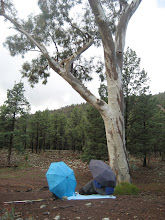It is not uncommon to hear people in Adelaide claim that they live in the driest city, in the driest state, in the driest continent on Earth. There have been drought conditions in this part of the world for the last several years. Often, when I walk the streets of my new hometown I reflect on this fact. As I look around me and see all the beautiful gardens and flowering trees, I find it hard to believe that there is a lack of water. Not only is there a lushness around me, but my skin feels hydrated, and I lack the constant thirst I have when I am in more arid country.
Throughout the winter we seemed to have plenty of days of rain. Far more than I ever saw when living in Southern Spain, or back in Albuquerque. Of course, the picture during the summer is different, and we can go several months without a single shower. During this time the plants turn brown from a lack of water and the extreme heat. However, during the dry season I still do not feel the effects of an extreme drought.
It was on a recent trip we took to Arkaroola Wilderness Sanctuary, an old sheep farm that has been returned to it's natural state, that that I was truly able to see the results of almost a decade of below normal precipitation. As we exited the car, I felt the moisture leave my skin and my lips crack. I immediately reached for my water bottle. The spectacular scenery around us was dulled by the oppressive effects of the drought. We did not expect this bleakness--after all South Australia has had the wettest winter in several years and just 250 km away we had crossed water filled gullies. I guess the waters had somehow failed to fall on this part of the northern Flinders Ranges.
We spent two days exploring the Arkaroola's peaks and gorges. Once we got over the barrenness, we found the color and the rugged peaks of the land captivating. However, the devastation of the drought was ever present as we walked though the lifeless landscape that lacked waterholes and wildlife. Apart from a flock of cockatoo's, 2 echidnas, and a lone 'roo at sunrise, we saw no other live animals while out on the trails, though there were plenty of sun dried carcasses--wallabies, kangaroos, and eagles.
The hardest part of the whole situation was man's lack of sensitivity to the dire situation of Arkaroola. While walking back tracks we passed camp sites where smoldering fires had been left unattended while the campers were off 4 wheel driving. We are very sensitive to this issue since one of the worst forest fires in New Mexico was caused by two tourists who left a smoldering campfire on a windy day. Then, there were the women in the campground who took the never ending showers. There were signs throughout the bathhouse reminding visitors of the lack of water, and asking us to minimize our use. Several times I found myself turning off dripping faucets and blazing lights. I can't help but wonder, if people would get out of their 4 wheel drives and walk the land, they would realize just how catastrophic the drought is. Perhaps then they would realize that we need to do all we can to lessen the human impact on an uncontrollable situation.






No comments:
Post a Comment